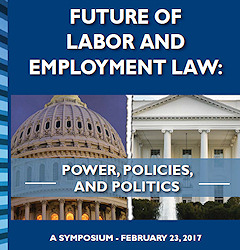
Future of Labor and Employment Law: Power, Policies, and Politics
Washburn Law's Center for Law and Government and the Washburn Law Journal are pleased to host the "Future of Labor and Employment Law: Power, Policies, and Politics Symposium."
With Congress gridlocked, federal agencies are increasingly at the forefront of regulatory change in labor and employment law. Supporters of these administrative initiatives defend them as both necessary and commendable. Meanwhile, critics challenge the form, scope, and substance of these agency actions. This symposium bridges these competing viewpoints across a variety of cutting-edge labor and employment law issues.
The symposium will feature a keynote address and three panel discussions comprised of nationally recognized experts in the field. The three panels will cover:
- The EEOC's Expansion of Title VII to Include Sexual Orientation Discrimination
- Religious Freedom and Accommodation Issues Arising from Regulatory Expansions
- The Stubborn Problem of Unpaid, Unregulated, and Illegal Labor
"Future of Labor and Employment Law: Power, Policies, and Politics Symposium" will be held Thursday, February 23, 2017, at the Bradbury Thompson Alumni Center on the Washburn University campus at 17th Street and SW Jewell Avenue. Free parking is available south and west of Bradbury Thompson.
Symposium Schedule
Thursday, February 23, 2017
8:00 a.m. – Registration
8:30 a.m. – Welcome
- Thomas J. Romig, Dean and Professor of Law, Washburn University School of Law
- Cristen R. Hintze, Editor-in-Chief, Washburn Law Journal
9:00 a.m. – Keynote Presentation

- Richard F. Griffin, Jr., General Counsel, National Labor Relations Board (See bio at NLRB website)
9:45 a.m. – Panel 1: The EEOC's Expansion of Title VII to Include Sexual Orientation Discrimination
With sexual orientation and transgender issues making daily headlines, the EEOC has determined that Title VII's sex discrimination provision goes beyond simple anatomy to include protection for gender identity and sexual orientation. This panel will discuss the rationale, implications, and judicial treatment of this interpretation.





- Naomi Schoenbaum, Associate Professor of Law, The George Washington University Law School (See bio at GWU website)
- Cynthia A. Brown, Brown and Associates, PLLC (Orlando, Florida)
- Walter Olson, Senior Fellow, Cato Institute (See bio at Cato website)
- E. Pierce Blue, Attorney Advisor to Commissioner Chai R. Feldblum U.S. Equal Employment Opportunity Commission (See bio at LinkedIn)
- Moderator: Thomas Witt, Executive Director, Equality Kansas
11:45 a.m. – Box Lunch (provided to registrants)
12:45 p.m. – Panel 2: Religious Freedom and Accommodation Issues Arising from Regulatory Expansions
This panel will discuss how the EEOC's expansion of Title VII and the NLRB's actions to expand jurisdiction over religious organizations may impact the free exercise of religion and religious accommodation in the work place. This panel will also consider the scope and limits of agency jurisdiction over religious and religiously affiliated employers.



- Dwayne Leslie, Associate Director,Department of Public Affairs and Religious Liberty; Director of Legislative Affairs, General Conference of Seventh-day Adventists (See bio at Adventists' website)
- Marcia L. McCormick, Professor, Center for Employment Law, Saint Louis University School of Law (See bio at SLU website)
- Joseph Mastrosimone, Associate Professor of Law, Washburn University School of Law (See bio at Washburn Law website)
- Moderator: Julie M. Covel, General Attorney, National Labor Relations Board
2:45 p.m. – Panel 3: The Stubborn Problem of Unpaid, Unregulated, and Illegal Labor
This panel will focus on the complications and consequences of utilizing unpaid labor with respect to interns, volunteers, and student athletes; illegal labor such as undocumented workers, forced labor, and human trafficking; and unregulated labor such as the classification of employees as independent contractors under on-demand business models. Panelists are invited to discuss the role of legislatures and administrative agencies in addressing these problems.





- Leticia Saucedo, Professor of Law, University of California, Davis School of Law (See bio at UCD Law website)
- Juliet Stumpf, Robert E. Jones Professor of Advocacy and Ethics, Lewis & Clark Law School (See bio at Lewis & Clark website)
- Sachin S. Pandya, Professor of Law, University of Connecticut School of Law (See bio at Connecticut Law website)
- Charlotte Alexander, Assistant Professor of Law, Georgia State University College of Law (See bio at GSU Law website)
- Moderator: Aïda M. Alaka, Associate Dean for Academic Affairs and Professor of Law, Washburn University School of Law (See bio at Washburn Law website)
4:30 p.m. – Adjourn
Short URL for this page:
http://washburnlaw.edu/futureoflaborlaw
You are welcome to attend the symposium but we are unable to provide lunch for individuals who have not pre-registered.
Date:
Thursday, February 23, 2017
Location:
Washburn University
Bradbury Thompson Alumni Center
Parking: south and west of Bradbury.
Get Map
There is no charge to attend. A box lunch is provided to those who pre-register (we are not offering specific dietary restriction accommodations though lunch will include a vegetarian option).
No CLE credit is being offered.
Seating for the symposium is limited. So that we may accommodate as many attendees as possible and be sure to order enough lunches, if you register and are unable to attend please contact, as soon as possible, Donna Vilander at donna.vilander@washburn.edu or (785) 670-1105.
If you require special services or auxiliary aids to assist you while attending the event, please call Donna Vilander at (785) 670-1105.
Symposium participants and other interested writers are invited to submit an article, essay, etc., related to the symposium topic for consideration by the Washburn Law Journal.
Inquiries about publication opportunities should be directed to Cristen Hintze, Editor-in-Chief, at cristen.hintze@washburn.edu.
Recent symposium issues of the Washburn Law Journal have focused on the future of housing, Brown v. Board of Education at 60, immigration law, oil and gas law, the rule of law and the war on terrorism (part 1 | part 2), and humanizing legal education. See the Journal's archive for other past issues.
Shawn Leisinger
Executive Director, Centers for Excellence
shawn.leisinger@washburn.edu
(785) 670-2464
Professor David Rubenstein
Director, Center for Law and Government
david.rubenstein@washburn.edu
(785) 670-1682.
Shelia Summers
Director of Marketing Communications
shelia.summers@washburn.edu
(785) 670-1784
